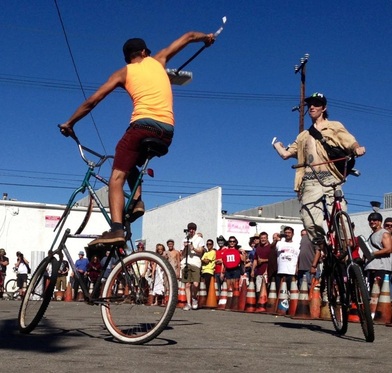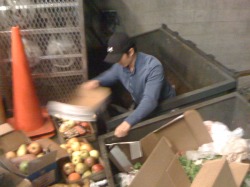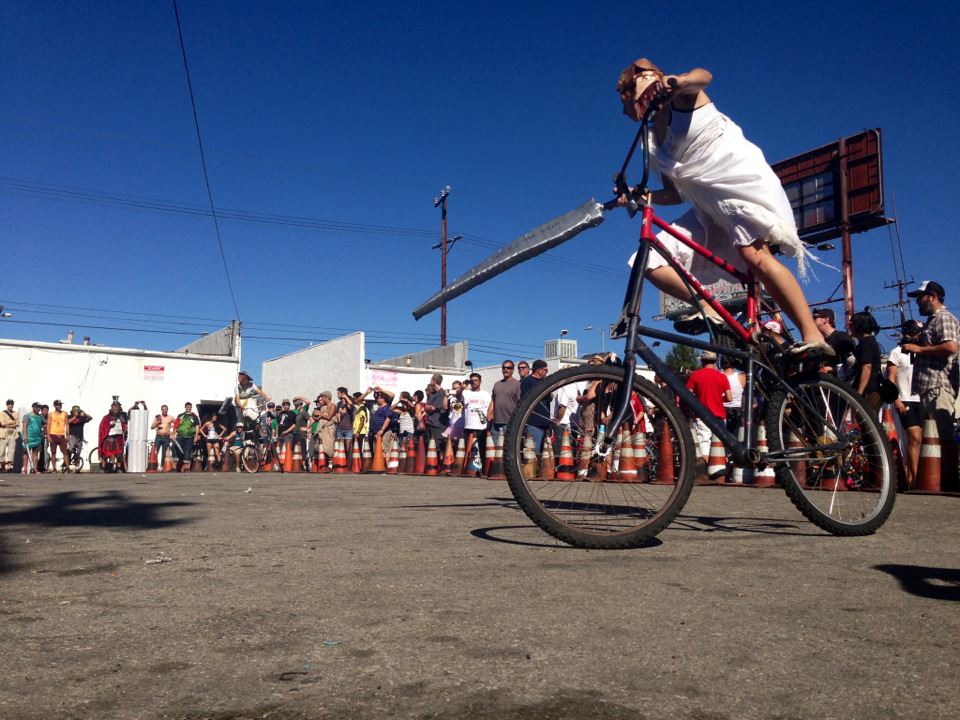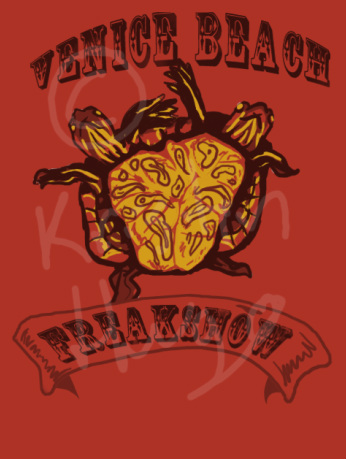 The pavement was stained and broken but the spirit had never been more intact.
Every year the halloween-themed bicycle event "Choppercapras Horrorcycles" takes place in the middle of the San Fernando Valley. This year it was to start 12 sharp, "not 12 hipster time," according to their facebook event page. I'd hate to imagine how late hipsters tend to be as this event didn't get going until 1:15 P.M. However, I forgave the tardiness after witnessing the games.
A host dressed like a Spartan stood at the back of a coliseum improvised from a parking lot with a circle of orange traffic cones. The steeds were tall bikes, welded together from the frames of two smaller bikes. The swords and maces were made from Styrofoam and duct tape; the audience roared and threw these weapons and nets at the participants.
During the chariot races the athletes rode dirty pick child's bicycles, their teammates on carts in tow. Between the intensity of the race and the shoddiness of the mount, several fell and wheels broke off mid-race, follies which only served to further enliven the audience.
The entropy, amiable bicyclists so mired in their own subculture, the silly costumes and rough-housing illustrated a notion that has been denied historically by Los Angeles residents--that the San Fernando Valley does have culture. The culture of the bicyclists embraces gritty, hap-hazard spontaneity was unlike any other I had witnessed, in LA or elsewhere.
The students in Writing, Reporting and Ethics took these pictures to represent their weekend. Kristine's was the photo of the man performing in Little Tokyo. "He's there performing every weekend." Kristine says that this performer has been on America's Got Talent. Monica works as the worship coordinator at a Church called Shepherd of the Hills, where she entertains kids with videos, coordinates plays, and teaches them bible study. "It's a lot for [the kids], it's fun." My picture is the one where I'm climbing on rocks. Some of my floormates and I have a bike race this saturday, and we trained by checking out the Chatsworth resevoir. We saw coyotes and places to climb, but there was no water in the resevoir.
"Citizen Artists Making Emphatic Statements" was the name of the exhibit that took place at the 18th Street Art Complex from July to September 2008. This art complex is a community of artists in Santa Monica. The exhibit, curated by Adolpho (Al) Nodal, focused on art that made important statements about issues such as sustainability. A local organization called Fallen Fruit, which focuses on utilizing fruit trees on public land for community use, showed in the exhibit. The organization makes maps of trees on public land so that individuals can find where to pick their own fruit. The organization operates out of Los Angeles and hosts local events, but it has a global perspective. "We kind of look at the whole world through the lens of fruit," said representative Matias Viegener. "That's become our sort of choice focal point, through which we examine a lot of other things." According to the 18th Street website, the center's mission is "to provoke public dialogue through contemporary ART making." Currently there are fifteen artists in residence there, and they often have events for the public to see the art.
To me a library symbolizes an environment of sharing, of passive anti-corporatism, where no one needs to even bring out their wallet before entering and using their services. However, a library still needs a lot of money, and the Los Angeles Public Library (of which there are 8 regional branches and a whopping 64 community branches) needs $117 Million, according to the Library's website ( lapl.org.) This is actually a $5.9 million cut from last year's budget. Since the California budget cuts, California's services are hurting, and the libraries are having no small amount of trouble as well. This budget cut means many branches will be closed both Sunday and Monday, and less books and programs will be available to the public. This is no good thing, but what budget cut is? If you were Mayor Villaraigosa, you would surely face opposition no matter what programs you decided to cut. This may sound biased as a voice behind a blog, but I think that libraries, while very nice and useful, offer services that are a bit outdated. Services that we could live without for a few days a week. For example, LA Weekly interviewed a student who appreciated getting a book from the library called Under the Rainbow: Growing up Gay. Great. Weekly quoted him saying, "The thing about libraries was that it was a place to get information for free." Hm, info for free? You don't say. I can tell you another place to get that service, and you're looking at it. Of course libraries offer more than that. This article from the Jewish Journal of Greater Los Angeles suggests that we cut money from a Gang Reduction and Youth Development program, as that program costs $5,245 per youth and the library, which serves many more young people, only costs $6.40 per youth. It cites the library as a safe place for students to go, and then inherently a hindrance to gang relations.
Other services are being hit even harder. According to this Daily News article by Rick Orlov, hundreds of people are being laid off, daytime child care programs are being canceled at parks and Kid's programs are being scaled back.
While I'm personally for social programs (well, now that I don't pay income tax), I think a small cut to the Public Libary's budget isn't going to kill anyone, so long as they are generally there. There are still thousands of places you can visit in LA on a Sunday, for which the city pays, like the nearest park or some community centers.
Los Angeles might not have the bike-friendliest of streets, but it has a thriving rider culture.
Tuesday nights there is a group of people who get together in a Vons parking lot and ride for miles. It's a highly social activity, with plenty of stops at liquor stores and bars, and it's called Tuesday Night Special.
I decided one night to go just to meet new people and kill time, but I didn't realize that this night could turn me to view bicycling as a passion. The most exciting part of the night was, of course, the ride. The group took up a whole car lane, dressed in bright colors and waving at cars. Going downhill was like riding a leg-powered roller coaster; it was so fast and just a little dangerous. To go so fast though the partially-lit streets powered only by your adrenaline is more than exhilarating.
Now I bike everywhere I go. I don't even need a car when I have the uninhibited speed and swiftness of a two-wheeler. I don't need to pay for parking, gas or insurance, and I get karma points from the environment. Now I consider myself a passionate bicyclist, and I bring other people to these night rides to try to awaken their passions.
 There's no diving board involved in dumpster diving, and it's not so theatrical and dangerous as to literally go swimming in garbage. Instead, the Los Angeles Dumpster Diving Meetup Group quickly and carefully sifts through discarded material in commercial dumpsters to "save" landfill-bound goodies.
Last Saturday night in Garfield Park, Pasadena, about a dozen people gathered to take part in this seldom-known art. The group's members are from Meetup.com, a website that connects people with similar interests to other locals. The group went to the dumpsters of Bristol Farms and Trader Joe's to recover apples, bananas, artichokes, iced tea, bagels, banana bread, potatoes...and enough food to fill the back of a flat-bed truck. At the end of the night, the divers took what they wanted from the truck, and the rest was donated to a soup kitchen.
Julianne Lee, a 25-year-old graphic designer, was going dumpster diving for the first time that night. "I want to see if it's true that companies throw away as much as people say they do, to see how wasteful we can be as an American society," said Lee while the group waited for the employees at Trader Joe's to leave.
Although divers scavenge for many things, including technology, clothes, and whatever else they can find in these back-alley treasure chests, this particular diving venture uncovered food. According to a 2004 study at the University of Arizona, Tuscon, the United States throws away nearly half of its food supply.
The group organizers were 45-year-old computer programmer Eric Einem and 21-year-old full-time volunteer Grace.
"For some it's about reducing their consumption...and recovering wasted resources. For others, it's about free food. For others, it's just fun," said Einem of dumpster diving.
This practice is, in addition to being a hobby or necessity, based on community. When Grace moved to LA, she "discovered that LA has, really, no freegan [those who salvage and scavenge goods] community, so I thought, 'well, let's build one!'"
The community has many attractive aspects to it. Those who are anti-establishment and anti-consumerism participate in freeganism because, as no money changes hands, it does not contribute to capitalism. Environmentalists take part because it saves food and goods from going to a landfill as well as minimizes the need for producing more food, which takes energy, water, and land. Humanitarians dumpster-dive to donate food to organizations like Food Not Bombs, which gets much of their food from dumpsters to help the hungry. The food is free, so it is good for frugal people (although oddly, there doesn't appear to be a huge increase with the recession.) Also, the thrill of treasure-hunting at night should enthuse any adventurer. The best adventurers ever, Flapjack and K'nuckles, are into it.
According to Freegan.org.uk, there are many reasons a store would choose to throw away food products. Sometimes it's because the food has gone bad. If this is the case, it's as apparent to the diver as it is to the clerk, and the freegan will toss it away again.
However, the majority of the time food is thrown away because the packaging is damaged, it's near or past its sell-by date (but not its use-by date), one item in a pack is damaged, there is seasonal wrapping, or the store wants to make room for new merchandise.
If you're in the Los Angeles area, you can go to meetup.com/freegan to accompany this group on a diving trip. If you live elsewhere, check the 21 other meetup.com groups created in this growing movement.
|




 RSS Feed
RSS Feed